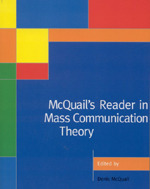McQuail's Reader in Mass Communication Theory
- Denis McQuail - University of Amsterdam, Netherlands
Mass Communication (General)
Divided into ten parts: Approaches and Conceptual Issues; Mass Media and Society; From Old to New Media; Normative Theory; Global Mass Communication; Media Organization and Production; Media Content; The Media Audience; and Mass Media and Effects, this collection represents an essential sourcebook for all students of media and mass communication.
McQuails Reader in Mass Communication Theory includes key statements from;
Pertti Alasuutari
Ien Ang
Jan L. Bordewijk
Jay G. Blumler
Roland Barthes
Oliver Boyd-Barrett
Muriel G. Cantor
James Carey
Peter Dahlgren
Daniel Dayan
Everette E. Dennis
Todd Gitlin
Alvin W. Gouldner
Robert M. Entman
Celia von Feilitzen
Marjorie Ferguson
Edward S. Herman
Terhi Rantanen
Stuart Hall
Joli Jenson
Elihu Katz
Judith Lichtenberg
John H. McManus
Joshua Meyrowitz
C. Wright Mills
Merrill Morris
John C. Nerone
W. R. Neumann
Janice Radway
Ronald E. Rice
Karl Erik Rosengren
James Slevin
Pamela J. Shoemaker
John Tomlinson
Gaye Tuchman
Ellen Wartella
Judith Williamson
Dolf Zillmann
Liesbet van Zoonen
Outstanding; prescribed for three years
Excellent reader with essential texts, documenting the development of mass communication research.
This is an excellent text and will be highly recommended to students.
This is a very good book. Unfortunately the chapters are not in the centre of the course, i.e. do not focus as much as expected on psychological aspects of the processing of mass communication
It's very useful for my students becuase it takes them in a very comprhensive way through all the main ideas that have formed the communication in a specific field of study
This is an excellent collection of research and theory. The emphasis obviously is on mass communication. My course Introduction to Human Communication has a wider scope including for example interpersonal comm, non-verbal comm and communication in a range of fields (organizational; political; international). Therefore, this collection is less suited for my course.




